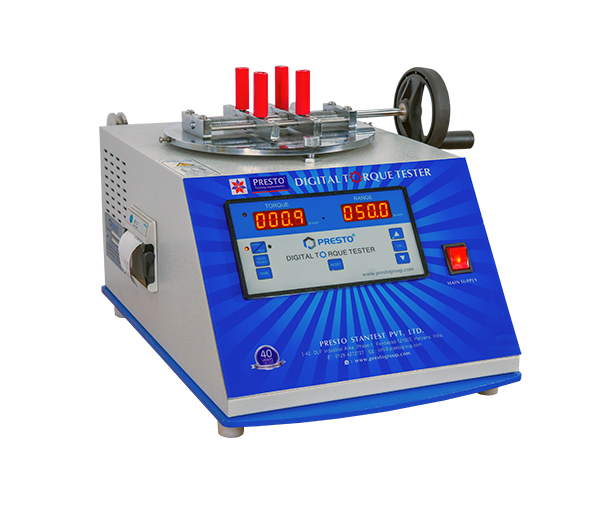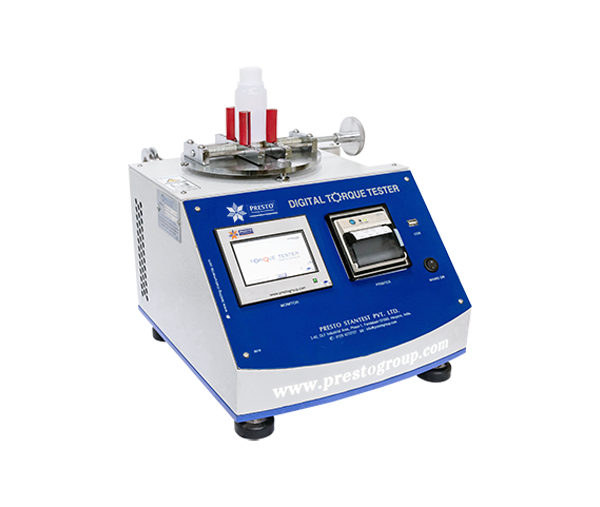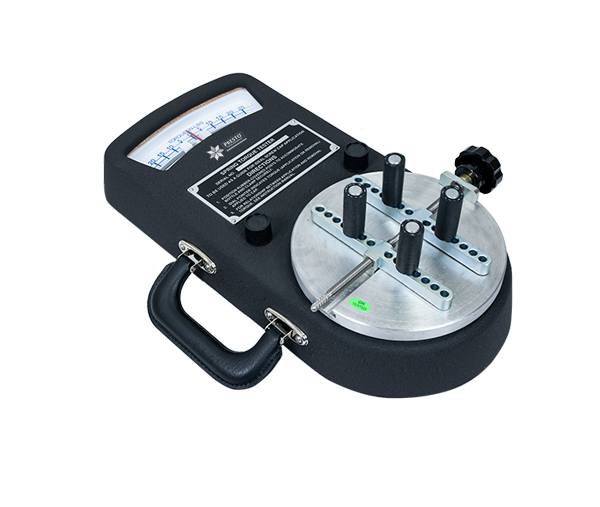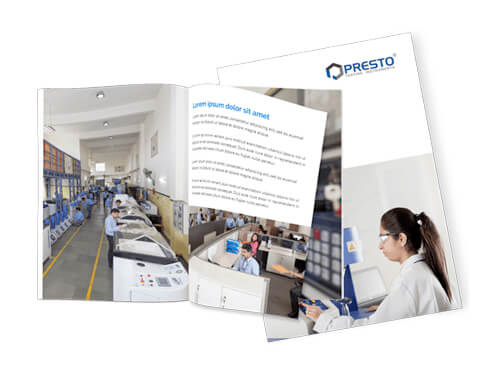Ensure Perfect Torque Strength: The Role of Torque Testers across Industries
.png)
Gaurav Malhotra-Testing Instrument Expert
19-11-2024
A very simple, yet crucial component in ensuring safety, reliability, and performance is the torque tester. While sealing your favourite soda bottle, ensuring that the car's brake components are fastened securely, or testing a variety of medical devices, torques are an essential part of every application. All these testers are of various categories, which include automatic torque testers, digital torque testers, and bottle torque testers, that can find the proper amount of torque to maintain the quality of the product.
Some products and mechanical systems require proper torque. The low amount of torque results in relatively loose parts, which have low stability. Such a system may be hazardous to safety or break the component down. Too much torque can strip the thread, destroy parts, or cause failure in the material. Torque measurement ensures that components utilize their functions optimized for safety and reliability.
Types of Torque Testers
Torque Tester Digital

Technical Specification:
- Accuracy: ± 0.5 lb-inch (with master weight calibration)
- Least Count/Resolution: 0.1 lb-inch
- Power Supply: 220V, Single-phase, 50 Hz
- Display: Digital (LED) 7-segment display
- Torque Monitoring:
- Peak Load Indicator with Digital Readout
- Peak Hold Feature (retains maximum load reading)
Specimen Holding:
- Minimum Diameter: 30 mm
- Maximum Diameter: 110 mm
- Calibration Weights (Optional): 10 lbs, 20 lbs
Torque Tester - Prima

Technical Specification:
Maximum Torque Range:
- 100 lb-inch
Accuracy:
- ± 0.5 lb-inch (with master load calibration for higher precision)
Least Count / Resolution:
- 0.01 lb-inch, 0.01 kg. cm, or 0.01 Nm for precise measurement readings
Power Supply:
- 220V, Single-phase, 50 Hz
Display:
- 4.3-inch HMI TFT screen for clear and user-friendly digital display
Torque Units:
- Options for displaying torque in lb-inch or Nm (user-selectable)
Specimen Holding Capacity:
- Minimum Specimen Diameter: 20 mm
- Maximum Specimen Diameter: 130 mm
Maximum Test Bottle Size:
- 2.5 litres
Sample Size Requirements:
- Minimum sample height: 25 mm
Anti-Vibration Pad:
- A specially designed anti-vibration pad helps reduce the effects of external vibrations for more accurate measurements
Safety Features:
- Overload protection to prevent damage during use
Torque Tester HMI Motorised
Technical Specification:
Advanced Security & Connectivity:
- VNC software with advanced security features for remote access and control.
- Equipped with USB and RJ45 ports for easy data transmission and USB-PC connection (RS-485 support available).
Intelligent Test Operation:
- Automatic Peak Value Retention: The peak torque value is automatically retained and recorded, ensuring precise test results.
- Overload Protection: Intelligent overload protection is designed to safeguard the system during testing.
- Automatic Zeroing: The system automatically zeros itself for accurate readings.
- Error Alerts: Built-in error detection alerts ensure safe and correct test operations.
Data Management & Storage:
- Automatic Data Storage: Test data is automatically saved, even during power failure, with memory recovery after restart.
- Large Storage Capacity: Up to 9999 test results can be stored for later review.
- Real-Time Test Curve Display: The test curves are shown in real time for immediate feedback.
- Data Statistics & Review: Intelligent data statistics support quick review of test results, with graphical representations.
User-Friendly Interface:
- Intelligent Touch Operating System: Patented software with an intuitive touch interface for easy navigation.
- Industrial-Grade Touch Screen: A durable and responsive touch screen with one-button operation for ease of use.
- Multiple Units: Supports switching between different torque units (Nm, kgf·cm, lb·in) for flexibility.
- Pass/Fail Criteria: Users can set custom pass/fail limits, and these criteria are automatically updated in the test report.
Motorized and Repeatable Testing:
- Servo Motor-Driven System: Ensures constant rate of travel and highly accurate, repeatable movements during testing
- Motorized Drive: Provides consistent and precise movement for repeatability across tests.
- Quick Change Cap Adapter: Easily replaceable cap adapters, including universal or custom-made options tailored to the specific shape of a cap.
Calibration & Quality Assurance:
- Calibration with Traceable Reference Weights: The system can be calibrated with certified reference weights for high precision.
- Statistical Analysis: Automatic statistical analysis of results per batch of samples, with graphical output incorporated into reports.
- Large HMI Display:
- The large display screen ensures easy viewing of test data, making it user-friendly for operators.
Torque Tester - Analogue

Technical Specifications:
- Max. Torque Range: 20 lb-inch
- Accuracy: ± 0.5 % full Scale(with master load)
- Least Count/Resolution: 1 lb-inch
- Power: Battery-operated
- Minimum Diameter for specimen holding: 30 mm
- Maximum Diameter for specimen holding: 110 mm
- Max. size of test bottles to be tested: 2.5 litres
- Weights for Calibration: 10 lbs, 20 lbs
Applications of Torque Testers Across Industries
Torque testers are important in most industries and fields to ensure that final products are safe, durable, and of excellent quality. Let's discuss a few common application scenarios where torque testers play a vital role.
1. Bottle Packaging Industry
Among other applications, one of the most popular applications of torque testers is in the bottle packaging industry.
hey use bottle torque testers and automatic torque testers, ensuring the bottles are well secured. It could be soda bottles, pharmaceutical products, and cosmetics. When the cap is sloppy, the contamination of the product could spill over; if it is over-torqued, the customer may fail to open it. This aspect attracts user experience and product functionality. The manufacturers can easily determine the force applied to the cap by using a bottle torque tester as it must fall within the needed torque range. This would not only be vital for ensuring quality but also fits the necessary torque standards of the industry.
2. Automotive Industry
In the automotive industry, torque testers are considered key devices with critical assembly points such as brake parts, engine bolts, and other suspension fasteners. The failure to tighten these components may cause mechanical malfunctions and pose safety risks, which could even lead to accidents. In the absence of precise torque specifications achieved through digital torque testers, car manufacturers can lay out expensive repairs and recalls.
For instance, when assembling a car engine, bolts on the cylinder head would have to be tightened to an extremely specified torque so that it is not deformed or leaking. Torque testers ensure such critical fastenings are performed correctly.
3. Aerospace Industry
In the aerospace industry, the possibility of precision becomes a major issue, and torque testing is a powerful tool used to check if fasteners, bolts, and structural components are in proper condition. Deviation in such a small measurement may be disastrous in a high-stakes environment of aircraft assembly or maintenance. Typically, they utilize high-accuracy digital torque testers with data logging capabilities, which means the tightening process is documented, and an audit trail is created for compliance and safety regulations.
4. Electronics and Medical Device Manufacturing
In electronics and medical instrument manufacturing, torque testing is used to ensure that screws, fasteners, and other components are tightened within tolerances that will prevent failures during operation. For example, a screw applied onto the circuit board needs to have a uniform torque so that those sensitive components are not damaged. Proper torque in a medical instrument such as a pacemaker or surgical instrument may ensure that a patient's safety is maintained by preventing component failure.
5. Heavy Machinery
Torque testers are also found to be used in determining if fasteners on heavy equipment, cranes, bulldozers, and excavators, have been tightened to the right amount of torque. Sometimes this can cause structural failure, breakdown, or unsafe machinery due to misapplied torque in critical machinery. Torque testers enable technicians to obtain the torque required by machines to run correctly and safely.
Formulae to Calculate torque:
Torque (T) = Force (F) \ Distance(d)\sin(θ)
Where:
T = Torque in Newton-meters or N·m
F = Force applied in Newtons.
d= Distance from the pivot point measured in meters
θ = Angle between the force vector and the lever arm in degrees
FAQs
How do you test for torque?
Torque testing means the application of force to a rotating object like a screw or bolt to determine the amount of resistance or rotation that occurs. The torque tester will keep track of the amount of force it takes to turn the object to confirm if the amount indeed falls within the specified torque levels.
How accurate is the torque tester?
A good quality torque tester can typically offer an accuracy of ±0.5% to ±1%, based on the model and calibration.
What is a bottle cap torque tester good for?
A bottle cap torque tester is mainly designed to determine the tightening of the bottle caps so as not to be either too loose, with the possibility of leakage, or too tight to open; hence, it will ensure the safety of the products and satisfy the consumers.
Torque testers are something that ensures the quality and safety of products.
Accurate torque measurement has taken the form of securing vital automobile components and medical devices from bottle caps being tightened. Today, it remains to be the integrity and reliability of everyday products. Knowing the specifications, maintenance needs, and applications of torque testers will lead to better quality control and optimal production processes since manufacturers seek to satisfy stringent safety standards. Whether you need a digital torque tester for accurate measurements or an automatic torque tester for high-volume testing, a solution is available to suit the specific needs of the user.
Phone: +91 9210 903 903
Mail: info@prestogroup.com
Recent News
- Paper & Packaging Testing Instruments
- Paint, Plating & Coating Testing Instruments
- Plastic & Polymer Testing Instruments
- Environmental Testing Chambers
- PET & Preform Testing Instruments
- Color Measuring Testing Instruments
- View Entire Range Instruments

Catalogue 2023
Get information about new product launches, research, innovation and endeavors at Presto.
download Free CopyNeed more information
Connect with us for your business enquiries. Generally we respond within one or two working days.
send enquiriesContact Us
Get a Quote
